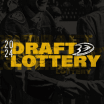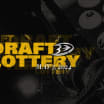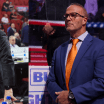With one eye on the present and the other on the future, Todd Marchant is a busy man. And even though the Ducks season is nearing an end, Marchant's work is far from over. As the Ducks' Director of Player Development, Marchant is responsible for preparing and educating Anaheim prospects on succeeding in professional hockey. It's a role he takes tremendous pride in.
Toyo Tires Ducks Alumni Spotlight: Todd Marchant
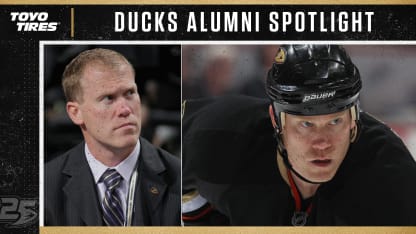
The 45-year-old Marchant joined the Ducks front office staff in 2011-12 following six seasons with the Ducks and an 18-year NHL career that included 1,195 career games. Marchant won his first and only Stanley Cup with the Ducks in 2007.
He broke into the NHL as a 20-year-old, and leaned on veteran teammates for guidance on being a pro on and off the ice. Marchant remembers how beneficial it was to have positive role models around during that time, so he makes sure Ducks prospects get that same kind of attention.
"It's become ever-more apparent that development within an organization is crucial," Marchant says. "It starts with good scouting and shifts into my role as player development. Then it rolls into the coaching staff, both in the American Hockey League and the NHL. There are a lot of different people that have a role in developing these players."
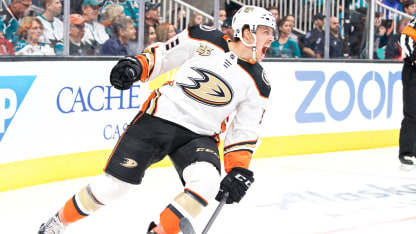
© Icon Sportswire/Getty Images
Each year it begins at the NHL Draft, held annually in June, where Marchant forges relationships with the organization's newest (and youngest) players. "Every team will get a suite in the arena," Marchant explains. "That's where their families can go and get a chance to sit down and meet more people from the organization. That's where I kind of take over and start to get to meet them a little bit. Get them to know about me and what I do, and get them prepared for development camp, which comes right away after the draft. Just starting that dialogue with the players that are there."
But for the players that aren't at the draft, especially those picked in the later rounds, Marchant starts the connection with them over the phone. "As soon as we make that selection, Martin Madden [Director of Amateur Scouting] is giving me their contact information and I'm on the phone congratulating them, welcoming them to the organization. We try to get to them as soon as possible. It's a big day for them, and they want to celebrate with their families. It's important for us to start that relationship with them, so that in two days, when they're flying out to California, they're ready to get to work and get better."
The draft also gives Marchant an idea of where he'll be traveling that year to check in on the newest prospects (in addition to previous selections). Marchant says it goes far beyond the simple task of scouting the players.
"It lets them know the team that drafted them is genuinely concerned about where they're at, how they're feeling, how they're playing, what can they do better and what have they done well," he says. "These kids are 18 years old, maybe 19 years old when they get drafted. They're still kids. Even a college player who spent four years and came out when they're 23, they're still kids. Or it's a kid that came out of juniors at 20. They're still kids. They have lots to learn about being a pro, how to carry yourself both on and off the ice, living on your own, having to make your own meals. All that sort of stuff.
"It's a lot for a young person. On top of that, being a professional athlete at the same time. There are lots of different things thrown at them. You're just there to be a sounding board."
Marchant's job has taken him all over the world. Last June, when the Ducks selected Isac Lundestrom with their first-round pick, he knew he'd be heading to Europe. "You figure out where you're going that year, and obviously you have the guys you've drafted in previous years," he says. "We drafted Isac, so I'm off to Sweden. We drafted Benoit-Olivier Groulx, so I'm off to Halifax [Nova Scotia]. Every year, it's like, Where you are going to be going that year, as well as the places you've been prior to that? This job has taken me to a lot of different places all over the world. It's been an adventure from Day 1."
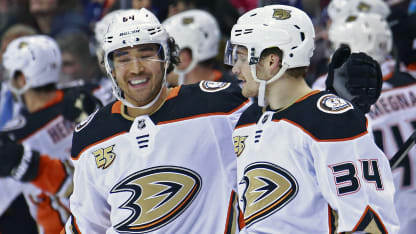
© Jeff Vinnick/Getty Images
The Ducks roster this season has featured several young players that Marchant has helped develop over the years. On Opening Night alone, the roster included six rookies - the most in franchise history: Lundestrom, Max Comtois, Marcus Pettersson, Kiefer Sherwood, Sam Steel and Troy Terry. You can add Max Jones to the list, too, as the 21-year-old made his NHL debut Jan. 17 in Minnesota.
As those names were reeled off, Marchant beamed like a proud father. "It's the cherry on the top of the sundae for someone in my role," Marchant says. "There's no better feeling than seeing a kid on Draft Day, meeting him for the first time, meeting his family, working with him at development camp and going out to see them play wherever it may be. Being able to see them throughout the season, seeing where they've come throughout the full year and where they're at the next summer. Eventually, turn pro and watch them grow in the American Hockey League and finally see them play in the NHL, and to have a stay in the NHL. That's the most important thing. That's the most rewarding thing for someone who has my job title.
"You'd like to have them all develop and play in the NHL, but that's unrealistic," Marchant says. "We've been very fortunate over the past 10 years where we've drafted and developed well. We've seen a lot of those players now playing for us in Anaheim."
When Marchant isn't traversing the world, he finds enjoyment behind the bench. He's coached all four of his kids (daughters Lillian and Ashley, and sons Timothy and Bradley) at some point in their hockey careers. It's truly a family affair. "[Lillian and Ashley] played with the Lady Ducks and are now playing in college," he says. "[Tim], who is finishing up his Jr. Ducks career this year, I coached him. Now, we have our youngest son, Bradley, who we coach. He'll be a second year Squirt. My wife and I coach his team. It's fun to be a part of that with them and see how they grow with playing a game we love."
In a moment of reflection, Marchant recalls a moment from the mid-2000s that brought things into perspective. "I remember when Ryan Getzlaf and Corey Perry were rookies and came over for Thanksgiving. They were kids themselves. Now they're the veterans of the team. That's the way the cycle goes."


